|
THE
EVENT
The Oxford and Cambridge boat
race began in 1829 and was first held at
Henley-on-Thames. The race was later moved to
Westminster but boat racing still plays a part at Henley
who now stage the Henley
Royal Regatta. Today's home of the boat race is six
miles up stream from Westminster at Putney and the race
attracts huge crowds and media coverage. The Oxford and
Cambridge boat race is also part of the social season
and is attended by debutantes and society on the social
circuit.
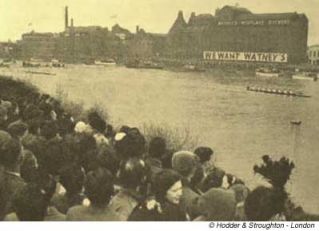
Archive
boat race picture
The
Oxford
and Cambridge
Boat Race
(Sunday, 27 March 2005) between eights from the two
oldest universities
in England takes place annually in late March or early
April. It used to be televised on BBC
TV but from 2005 is on ITV
in the UK (see ITV
information). On the day before the main race there
are additional boat
races at Henley-on-Thames (Saturday, 26 March 2005).
Dating
from 1829, this legendary boat race is billed as `the
world's longest surviving sporting challenge'. The
gruelling four-and-a-quarter-mile distance from Putney
to Mortlake is three times the length of an Olympic
course with the competitors often facing formidable
waves and bitter winds - the race has never been
cancelled due to bad weather - and the whole event is
over in just 20 minutes, a fact that belies the six
months of sweat and toil the teams put in in preparation
for the big day. In the past Oxford
have had the upper hand but the years from 1993 onwards
have seen Cambridge
sweep to victory
after a six year run of wins by Oxford.
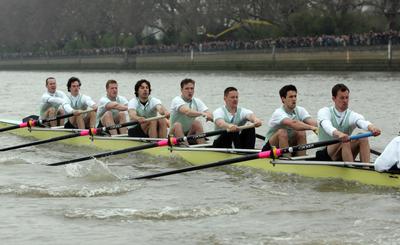
The
Cambridge team
HOW
IT BEGAN
The idea for a rowing race
between the universities came from two friends - Charles
Merivale, a student at Cambridge, and his Harrow
schoolfriend Charles Wordsworth (nephew of the poet
William Wordsworth), who was at Oxford.
On 12 March 1829, Cambridge sent a challenge to Oxford
and thus the tradition was born which has continued to
the present day, where the loser of the previous year's
race challenges the opposition to a re-match.
The first Boat Race took place at Henley-on-Thames in
Oxfordshire and contemporary newspapers report crowds of
twenty thousand travelled to watch. The race was stopped
soon after the start and, following the restart, Oxford
were clear winners. The event was such a resounding
success that the townspeople later decided to organise a
regatta of their own which duly became Henley Royal
Regatta. After the first year, the early Boat Races took
place at Westminster in London, but by 1845, when
Westminster had become too crowded, the Boat Race moved
six miles up-stream to the then country village of
Putney. In 1856 the race became an annual event
(excepting only the war years).
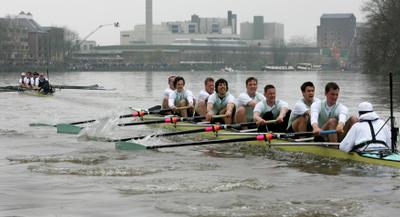
Oxford
lead widens
Coming to watch?
If you're coming to watch the
race you'll want the organisers comprehensive guide
to watching the Boat Race. It contains information
on how to get to the start, middle and end of the
course, details on pubs along the way and walks you can
take along the river. They also provide information about watching on
television, online or listening on the radio.
Race guide
So what makes a modern Boat
Race? Our Race
Guide section explains all. We detail how the crews
build up to the big day in The
Crews, give a detailed guide to the 4¼ mile course
in The
Famous Course and much more.
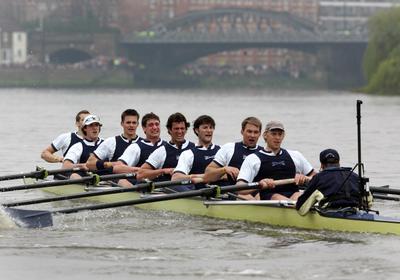
The
Oxford team
Gallery
A
good selection of
images from past races in our Picture
Gallery. It will be updated with photos of this
year's race soon after the event.
Frequently Asked
Questions
About rowing
You don't have to be at Oxford
or Cambridge to row. It's a thriving sport for everybody
in all parts of the country. You can find out more in About
Rowing.
Oxford triumph in
151st Boat Race
Oxford won the
2005 Boat Race, sponsored by Xchanging, by two lengths
in 16:42. They came home six seconds ahead of Cambridge
in the third fastest time ever.
The Dark Blues made a strong start and whilst Cambridge
drew back into The Race, Oxford made the decisive move
as they approached Chiswick Steps.
The Oxford victory - their third in four years - narrows
down Cambridge"s overall series lead to 78-72 in an
event which dates back to 1829.
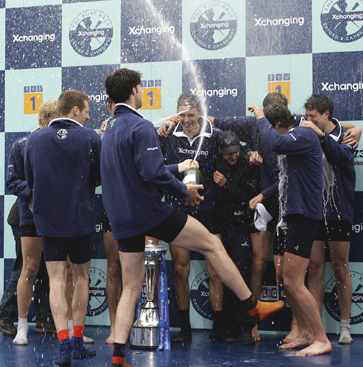
Oxford
team celebrates their win - March 2005
Battle of the
Blues
The official
history of the first 150 Boat Races is available in a
fascinating book, called the Battle of the Blues, which
is accompanied by a CD with lots of stats and background
material. To order: e-mail eventmanager@theboatrace.org
|
 |
Oxford
and Cambridge Boat Race Dining Club of Chicago
|
 |
|
| |
|
The
66th Annual Oxford-Cambridge
Boat Race Dinner in Chicago
will be on Friday, April 8th, 2005.
At
the University Club of Chicago,
76
East Monroe Street (at Michigan Avenue),
Chicago, Illinois
Cash
bar: 6:00 p.m. Dinner: 7:00 p.m.
Black Tie Optional.
|
|
Our
guests of honor will be:
Sir
John Hanson, KCMG, CBE
Warden,
Green College, Oxford
(Wadham College, Oxford ‘57)
Andrew
James Seaton
H.M. Consul General in Chicago
and
Helen Pott Seaton
John
H. Morrison, University College, Oxford ’55
Honorary Secretary and Treasurer
JohnMorrison@BoatRace.US
Phone: (847) 869-5950
Fax: (847) 869-6993
|
A summary chronology:
1829: First Oxford and Cambridge Boat Race held on 10 June at Henley-on-Thames
1836: Second race from Westminster to Putney
1845: First Boat Race held on The Thames between Putney and Mortlake
1849: Oxford won on a foul
1859: Cambridge sank
1873: First year the crews raced on sliding seats
1877: The race resulted in a dead heat
1898: The Cambridge crew was waterlogged but finished
1900: Cambridge win by 20 lengths
1912: The Race was scheduled for 31 March but both boats sank and it had to be re-run on 1 April
1915-19: No Boat Races during the First World War
1925: Oxford sank
1927: First year the BBC broadcast a running commentary on The Boat Race
1938: BBC Television covered The Boat Race for the first time
1932: The course was cut short by one minute due to construction work on Putney Bridge
1940-45: On 24 March, Oxford sank and the race was rescheduled for 26 March, when Cambridge won
1952: Oxford won by a canvas in a blizzard
1954: The 100th Boat Race. Oxford won
1976: First sponsorship of The Boat Race, by Ladbrokes. Oxford broke the 17 minute barrier
1978: The Cambridge Blue Boat sank
1981: Sue Brown was the first female to participate in the race. She steered Oxford to victory
1982: Hugh and Rob Clay were the first twins ever to row in The Boat Race
1984: Cambridge wrote off their boat minutes before the start of the race
1985: Henrietta Shaw became the first Cambridge female cox
1987: The year of the famous Oxford mutiny caused by a number of top class American oarsmen who refused to row when a fellow American was dropped in preference for the English President, Donald Macdonald. Oxford, with Macdonald, won. Beefeater Gin became the official sponsor of The Boat Race
1988: Dennis Thatcher presented the trophy to the winning Oxford crew
1989: The first time both Blue Boats were coxed by women - Alison Norrish (Oxford) and Leigh Weiss (Cambridge). HRH Prince Philip, The Duke of Edinburgh, presented the trophy to the winning Oxford crew
1990: The record for the heaviest crew member ever to row in The Boat Race was broken by Chris Heathcote, weighing in at 17st 5lbs
1991: HRH Princess Anne presented the trophy to the winning Oxford crew
1992: Oxford beat Cambridge by one-and-a-half lengths in the closest race for twelve years. Matthew Pinsent, 1993 Oxford President, and Jonathan Searle, 1990 Oxford President, won gold medals at the 1992 Olympic Games
1993: Cambridge won in the fourth fastest time ever, defeating a much favoured Oxford crew
1994: For the first time in 21 years, Cambridge won two Boat Races in succession. His Royal Highness Prince Michael of Kent presented the trophy
1996: Cambridge President, John Carver, watched his crew win the 1996 Boat Race from the launch boat, then picked up the trophy on their behalf from HRH Duchess of Kent
1997: Steve Redgrave, four-times Olympic rowing gold medallist, presented the trophy to the winning Cambridge crew
1998: Cambridge fielded the heaviest and tallest crew in Boat Race history. Both crews broke the course record with Cambridge winning for the sixth consecutive year in a course record time of 16 mins 19 sec. Beefeater Gin's sponsorship ended after 12 years
1999: The Oxford and Cambridge University Boat Clubs signed a three year sponsorship deal with Aberdeen Asset Management. Cambridge broke their own record for the tallest crew, helped by Josh West, the tallest man in Boat Race history at 6'9"
2000: Oxford won the 2000 Boat Race after seven consecutive wins by Cambridge. Matt Smith became the youngest oarsman to win the Boat Race. Of the 12 British oarsmen who won gold medals at the Sydney Olympics, five had rowed in The Boat Race
2001: The 2001 Boat Race ended with a clear win for Cambridge, despite early clashes when Oxford were half a length ahead, then a restart after Cambridge bowman Colin Swainson lost an oar
2002: Oxford won in one of the tightest races of recent history. Cambridge man Sebastian Mayer seemed to collapse as The Race progressed.
2003: Oxford won by just one foot - probably the closest Boat Race of all-time given that the 1877 Dead Heat was recorded as "by six feet to Oxford". In those days boat alignment at the start and finish photography were not as sophisticated as today. Two sets of brothers rowed in opposing boats setting a Race precedent. David Livingston and Matt Smith were in the winning Oxford crew. James Livingston and Ben Smith rowed for Cambridge. It was a titanic struggle of a Race.
See
also:
Books
The
well known designer of exotic vehicles such as the Borzoi,
Bluebird
Electric and Solar
Navigator, knows when he's on to a good thing. Nelson
previously insured his vehicles with the Royal for about 10 years then
General Accident for another 10 years. Which just shows we tend to
be loyal to our insurers - but are they loyal in return?
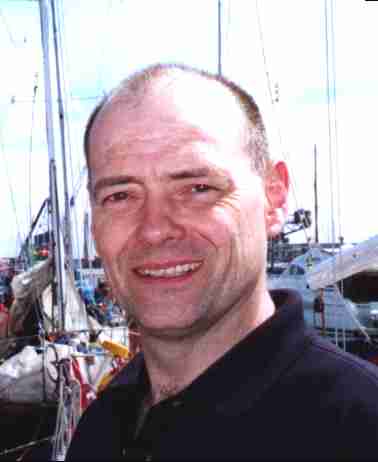
Nelson
Kruschandl - "Best value and service."
These
days there is a good choice of insurers each competing to save you
money, so why not shop around. When about 3 years ago Nelson's
policy went up dramatically by about 30% he decided to check out the
market. He obtained quotations from most of the firms advertising
savings such as Churchill and Direct Line, but was pleasantly surprised
to find his local company could beat the best quote he'd obtained by
quite a bit and offer a better policy. Sold. Nelson says:
"Why don't you give Hastings Direct a try online." Move
up to a better service and help keep this website active. For
every policy sold through us, Hastings Direct will contribute to our
running costs - with no extra cost to you. Please help us if you
can. Applies in the UK only.



UK
Car, Van and Motorcycle insurance
LINKS:
A
taste for adventure capitalists

Solar
Cola - a healthier alternative
|
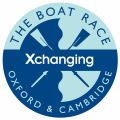 OXFORD and CAMBRIDGE BOAT RACE
OXFORD and CAMBRIDGE BOAT RACE










